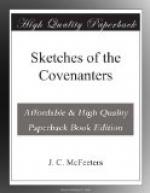The day for testing the Liturgy arrived. Attention was chiefly concentrated upon the Church of St. Giles at Edinburgh. The large auditorium was filled with Presbyterians who were accustomed to worship God in the plain, solemn manner of the apostles. The suspense preceding the service was painful. Each heart was beating fast, repressed emotion was at white heat, the atmosphere was full of electricity, no one could tell where the fiery point would first appear. At length the dean stood in the pulpit before the gaze of his insulted audience. He opened the new book and began. That was enough, the spark struck the powder, the explosion was sudden. Jean Geddes, a woman whose name is enshrined in history, and whose stool is a souvenir in the museum,—Jean, impelled by a burst of indignation, bounced from her seat and flung her stool at the dean’s head, crying with a loud voice, “Villain, dost thou say mass at my lug?” The unpremeditated deed acted as a signal; the whole congregation was immediately in an uproar; the dean fled and the service came to an undignified conclusion.
The indignation manifested itself in many other places that Sabbath. In the Greyfriars’ Church, there were deep sobs, bitter crying, and wails of lamentation. Over the entire kingdom the excitement was intense. The Scotch blood was stirred; the king had outraged the most sacred feelings of the people. They held meetings, prayed to God, and petitioned the king. The king replied to their petition, like Rehoboam, with blustering insolence. The Covenanters were not intimidated, their determined resistance was contagious and stirred vast communities, national sympathy was aroused; the Holy Spirit wrought mightily upon multitudes. Three days after the king’s haughty reply had been received, a procession, including twenty-four noblemen, one hundred ministers, and bands of commissioners from sixty-six churches, marched boldly into Edinburgh and enforced their petition by a demonstration of strength, with which not even the king could afford to trifle.
[Illustration: Jean Geddes throwing her stool.
Jean Geddes sat convenient to the pulpit on the eventful Sabbath, when the dean attempted to introduce the new “Prayer Book” in St Giles’ Church. The innovation had by anticipation filled the people with intense indignation. A storm was brewing. This heroine, unable to restrain herself, sprang to her feet and hurled her stool at the dean’s head, exclaiming. “Villain, dost thou say mass at my lug?” The dean dodged the stool and escaped. Confusion followed, and the service for that day was abandoned.]
Do the children of these Covenanters appreciate the value and power of the truth? Have the fundamental principles of the kingdom of Jesus Christ become incarnated in our lives? Do the doctrines of the Word circulate in the blood, throb in the heart, flash in the eye, echo in the voice, and clothe the whole person with strength and dignity? Is the Covenant of these ancestors a living bond that binds the present generation to God, through which His energy, sympathy, purity, life, love, and glory descend upon us in continual streams of refreshing? Then will our mission on earth be fulfilled, our work in the Church will be blessed, our testimony for the Lord will be powerful, and our efforts to win others for Christ will be fruitful.




